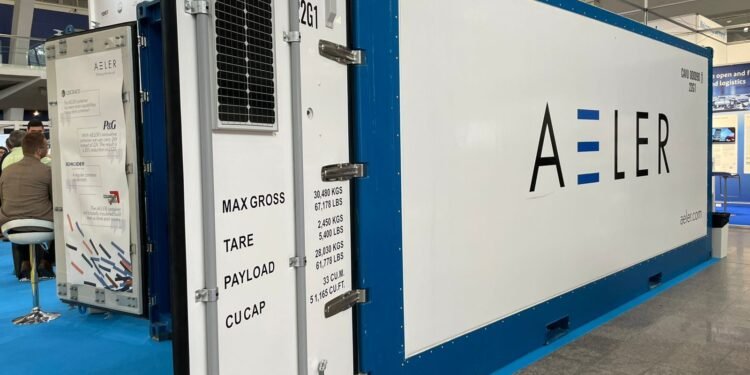Belgium, (Brussels Morning) With 80% of goods traveling in containers, the Swiss-based company AELER decided to reinvent the shipping container, which has not changed in 60 years, promising CO2 reductions and more safety and energy efficiency during transport.
“Smart” shipping containers
The new product has been developed as a “smart” device, with a range of digital applications embedded on its doors, enabling a large amount of data to be processed regarding the conditions of the cargo.
The new “smart” shipping container is being showcased at a high-level transport and mobility event, taking place in Lisbon until tomorrow — the TRA 2022, the European Research and Technology Conference.
Currently, there are 100 containers in transit, with hubs in Europe, the United States, Singapore, Turkey and Australia with clients such as Procter & Gamble, Columbus Cargo, Leshaco and Schneider already transporting goods using the new containers.
“The AELER container and its totally insulated build saves us time and money,” said Andreas Westermayer, Business Development at Columbus Group.
The company operates within three key sectors: flexitank, high value goods and sensitive goods. Each category has specific characteristics to ensure the safety of the associated cargo.
Moreover, AELER is proud to provide the new containers as a service, meaning that they don’t sell the “smart” containers, rather, they rent them, giving clients full control of the platform to track relevant data while the company takes care of the logistics.
“Our goal is to offer the containers as a service to increase flexibility in the logistic system. Clients will have access to the platform and all the data relevant to their containers,” said the AELER’s Co-Founders Naïk Londono and David Baur.
The company is prepared to continue growing with another 6,000 units expected to be manufactured in 2023.
“The logistics industry is ripe for a new technological breakthrough. With the AELER container, we are reworking the very foundations of this trillion-dollar industry,” said Baur.
First developed in 2018 and certified in 2021, after passing a range of validation tests, the new containers are made of recycled plastic intended to be reused after the end of their life cycle thus contributing to the development of a functional circular economy.
CO2 reduction
According to the company, AELER has re-invented the container, enabling customers to load more goods while cutting CO2 emissions by 20%, since the new containers carry more weight while being lighter and aerodynamic.
Based on a latest study from Transport & Environment (T&E), 84% of shipping traffic goes through Europe, China and the US. If these economies were to regulate ships calling at their ports, T&E said, they could decarbonise the lion’s share of the industry and in doing so bypass the “ineffective” International Maritime Organisation (IMO).
“Efforts to decarbonise shipping at the IMO have so far been miserable. The need for consensus at the global level has brought us nowhere. But there is a much easier way to do it. With the vast majority of ships passing through Europe, China and the US, these leading economies can unilaterally regulate emissions without relying on the ineffective IMO,” said Jacob Armstrong, sustainable shipping officer at T&E.




